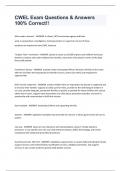CWEL Exam Questions & Answers
100% Correct!!
Who needs a license? - ANSWER In Illinois, DCFS and private agency staff who
work as caseworkers, investigators, licensing workers or supervisors of any of these
positions are required to have CWEL licensure
"Orphan Train" movement - ANSWER placed as many as 150,000 orphans and children from poor
families in eastern cities with midwest farm families, many were only valued in terms of the labor
they could provide
Freedman's Bureau - ANSWER assisted newly emancipated African American families of the south
after the Civil War with educational and health services, direct cash relief, and employment
opportunities
DCFS mission statement - ANSWER protect children who are reported to be abused or neglected and
to increase their families' capacity to safely care for them, provide for the well-being of children in
our care, provide adequate, permanent families as quickly as possible for those children who cannot
safely return home, support early intervention and child abuse prevention activities, and work in
partnership with communities to fulfill this mission
dual mandate - ANSWER protecting children and supporting families
statutes - ANSWER legislative mandates that prescribe the manner in which government will use its
powers
case law - ANSWER based on court decisions and interpretations, doesn't include statutory
provisions- in any specific case, the court will interpret statutes, define terminology, and review
compliance with statutorily prescribed procedures
Social Security Act Title IV-B - ANSWER establishes requirements to receive federal funding for family
support services, time-limited family reunification services, adoption promotion, and support
services; it also creates funds for general child welfare services
,Social Security Act Title IV-E - ANSWER receive foster care reimbursement to achieve permanent
living arrangements, written case plans, periodic review of progress by an independent third party
Indian Child Welfare Act - ANSWER identified federal requirements regarding the removal and
placement of Indian children in foster or adoptive homes and allows the child's tribe to intervene,
intent is to "protect the best interests of Indian children and to promote the stability and security of
Indian tribes and families"
Inter-Ethnic Placement Act - ANSWER prohibits any consideration of children's race or ethnicity as a
factor in deciding which permanent placement will be in their best interest
Adoption and Safe Families Act - ANSWER requires reasonable efforts to move children to
permanency while providing that "a child's health and safety shall be the paramount concern"
Fostering Connections to Success and Increasing Adoptions Act of 2008 - ANSWER extends
assistance for foster care maintenance, adoption assistance, and kinship guardianship programs to
eligible youth age 18 up to age 21
Children and Family Services Act - ANSWER specifies the general duties and responsibilities of DCFS
Abused and Neglected Child Reporting Act (ANCRA) - ANSWER guides the day-to-day work of child
professionals in Illinois, requires the department to receive reports of abused and neglected children,
to investigate these reports, and to provide services necessary to prevent further harm to children
Juvenile Court Act - ANSWER establishes the authority of Juvenile Court to intervene in the lives of
children and families, all children in foster care fall under the jurisdiction of the Juvenile Court Act
Adoption Act - ANSWER specifies the grounds for parental unfitness and procedures for governing
adoption of children
Child Care Act - ANSWER establishes the licensing regulations governing child welfare agencies,
foster family homes, group homes, child care institutions, day care agencies, and individual day care
providers
Interstate Compact on the Placement of Children - ANSWER governs the provision of care for
children in foster care from one state to another
, Interstate Compact on Adoption and Medical Assistance - ANSWER governs the provision of medical
care to children who are adopted in one state and move to another state
Emancipation of Mature Minors Act - ANSWER provides a means by which mature minors who have
demonstrated the ability and capacity to manage their own affairs and to live wholly or partially
independent of their parents or guardian may obtain the legal status of an emancipated person with
the power to enter into valid legal contracts
Foster Parent Law - ANSWER foster parent rights and responsibilities
Abandoned Newborn Infant Protection Act - ANSWER "safe haven law", allows an infant no more
than 30 days old to be relinquished to a hospital, police station, or emergency medical facility
without question or consequence to the parent
Illinois Domestic Violence Act - ANSWER allows individuals to request orders of protection against
individuals who are inflicting physical abuse or neglect, or exploiting family/household members or
high-risk adults
Probate Act - ANSWER governs guardianship of minors and adults
The following are not reasons for children to be considered abused or neglected - ANSWER parents
or responsible caregivers leave the children in the care of an adult relative for any period, parents or
responsible caregivers depend on spiritual means or through prayer alone for the treatment or cure
of disease, and children not attending school
permanency initiative - ANSWER children's health and safety is the main concern, diligent searches
for missing parents or other family members must be made, a court permanency hearing must occur
for each child no later than 12 months after the date the child has entered foster care, and a
permanency hearing must occur no less than every 6 months as long as a child is in foster care; the
court must select a permanency goal for the child at the permanency hearing and reasonable efforts
are not required to unify children with parents when aggravating circumstances exist
Aristotle P V. McDonald - ANSWER requires DCFS to make a diligent search to locate joint placement
for siblings, as well as place siblings together unless there are certain exceptions, encourages
frequent contact between siblings by phone and mail and specifies visitation twice a month




